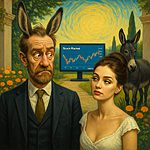The Gambler’s Mindset: Confronting the Secret Desire to Lose Syndrome
Dec 24, 2024
Introduction: The Investor’s Paradox – Embracing the Thrill of Defeat
Why are we so magnetically drawn to stories of failure and chaos, even when victory lies within our grasp? Beneath the surface of the investor’s psyche lies a paradoxical affliction—the secret desire to lose syndrome. It’s the silent saboteur that turns calculated risk into reckless surrender, all while cloaked in rationality. This mindset, lurking in the shadow of logic, thrives on drama and chaos, steering many towards disaster when triumph was theirs to seize.
Consider market crashes. To one investor, they are treasure troves ripe for plundering. To another, they’re the stuff of nightmares, a cascade of losses too terrifying to endure. Yet, it is not the market that defines these outcomes; it is the lens through which we view them. Fear or opportunity? Panic or poise? The battlefield is not external—it is within.
The truth is bold and unflinching: most investors are far more willing to consume the venom of negativity than to drink from the cup of optimism. Why? Because disaster commands attention. It roars louder, cuts deeper, and, perversely, feels safer than hope. But safety is an illusion. To win, you must unshackle yourself from the fear that binds you. You must challenge the allure of failure and rewrite your script.
The Investor’s Dilemma: A Tale of Four Glasses
Picture this: four glasses of water sit before you. A stranger whispers, “One of these glasses holds water from a jug where a dead fly once floated.” Suddenly, every glass is tainted. Rationality takes a back seat to fear. Would you drink, even if you were parched? Most wouldn’t.
Now, imagine the opposite. Another voice declares, “One of these glasses holds water from the purest Swiss spring.” Do you leap at the chance, embracing all four glasses in the hunt for perfection? Rarely. Suspicion, not hope, rules the mind.
This is the investor’s dilemma distilled to its essence: We are wired to fear loss more than we crave gain. The whispers of doom—predictions of crashes, collapses, and chaos—are met with rapt attention in markets. Investors scramble to sell, driven not by logic but by terror. Yet when whispers of opportunity arise, they are dismissed or ignored, lost in the noise of uncertainty.
This mindset is not an accident—it’s a product of evolutionary caution. But in the modern battlefield of markets, it’s a liability. Fear is seductive, but action is king. When the crowd panics, the daring few rise above, turning fear into fuel.
Market Crash Myths: Mastering the Gambler’s Mindset
A market crash is not the monster under the bed; it’s the roaring sea daring you to master its waves. Yet, time and again, investors surrender to fear. Gurus shout warnings of impending doom, and suddenly, quality assets are abandoned like flotsam in a storm. The gambler’s mindset takes hold—not the one driven by risk, but the one addicted to the spectacle of losing.
Here’s the unvarnished truth: life owes you nothing, and the market owes you less. Fairness is a fantasy. The only certainty is uncertainty. But in that chaos lies opportunity. While others drown in despair, the disciplined investor learns to swim.
Forget trying to control the uncontrollable. Forget lamenting the manipulation of markets or the whims of the crowd. Your focus must be razor-sharp: identify the trend and follow it with unyielding resolve. Trends are the market’s pulse, the rhythm of its dance. Ignore the noise; master the beat.
Victory demands defiance. It demands that you stare down the chaos, the fear, and the allure of failure and declare: “I will not falter.” Embrace the uncertainty. Harness the storm. And when the dust settles, stand victorious where others have fallen.
Life was, is, and will never be fair. Life is what you make of it. So don’t fret about things you cannot control; look for ways to take advantage of these situations. Sol Palha
Investing and the Desire for Defeat: Unmasking the Hidden Urge
So far, we’ve explored the paradoxes of investing. We’ll delve into the ‘secret programmed desire to lose Syndrome.’ From birth, we’re bombarded with information, much of which is a mix of cultural and religious values and societal norms. Unfortunately, much of this information, particularly regarding science and logic, is biased and untested. We’re often told to believe things based on tradition or because “that’s how things have always been.”
As we move forward, we must question these ingrained beliefs and strive for a mindset that embraces positivity and opportunity. By doing so, we can overcome the ‘secret desire to lose syndrome’ and set ourselves up for success in investing.
The Gamblers Mindset in Action: Real Examples
To understand the gambler’s mindset, consider the phenomenon of “chasing losses.” This occurs when gamblers, after losing money, continue to gamble to win back their losses. For instance, a gambler might lose a significant amount of money on a slot machine but continue to play, believing that a win is just around the corner. This behaviour is driven by the same dopamine release that occurs when winning, creating a cycle of addiction and loss. Another example is the “near-miss” effect, where a gambler almost wins but falls short. This near-win can trigger the same brain areas as an actual win, increasing the desire to continue gambling.
For example, if a slot machine shows two out of three symbols needed for a jackpot, the gambler will likely keep playing, convinced that a win is imminent. In the stock market, this mindset manifests in several ways. Consider the practice of “doubling down” on a losing position. Seeing their stocks plummet, an investor might buy more shares, convinced that a rebound is on the horizon. The initial logic is that lowering the average share cost will make future gains more substantial. However, this often leads to greater losses if the stock continues to decline, mirroring the gambler’s chase of losses. Another example is “overtrading,” where investors frequently buy and sell stocks in reaction to short-term market fluctuations.
This behaviour resembles a gambler continually placing bets, hoping to hit the jackpot. Overtrading incurs higher transaction costs and increases the risk of making poorly timed investment decisions driven by emotion rather than rational analysis. The “near-miss” effect is also evident in investing.
Imagine an investor who narrowly avoids a significant market crash by selling just in time. The relief and perceived skill can encourage them to take more significant risks in the future, believing they have a unique ability to time the market. This overconfidence often leads to reckless decisions and substantial losses when their luck runs out.
A real-world example can be seen during the dot-com bubble of the late 1990s. Many investors, seeing the meteoric rise of tech stocks, invested heavily, convinced that the trend would continue indefinitely. When the bubble burst, many doubled down instead of cutting their losses, buying more now-cheap stocks, believing they would bounce back. This behaviour led to significant financial ruin for many, as the market took years to recover.
The Gambler Mindset: Succumbing to the Herd Mentality of Loss
As time goes by, we are told how we should behave, how we should eat, what we should eat, who our friends should be, what type of career to aim for, what is socially acceptable and what is not, around what age we should look to settle down and what type of woman or man would we should choose to settle down with. Individuals are also taught that working for the group or community is the right thing to do and that being selfish is very bad.
We are taught to dedicate our lives to one person and promise to do this, even though we struggle to keep our New Year’s resolutions. People are not told that instead of saying I promise, we should say I will try my very best, but being weak and human, I might fail along the line. In most cases, this promise is guaranteed to achieve the exact opposite result, and if one looks at the statistics, the evidence is overwhelmingly in favour of this. It’s this fear of trying to live up to an ideal that most of us know that we cannot live up to that ends up causing the relationship to end.
Think out of the Box
Thinking outside the box is valuable in various aspects of life, including relationships and personal growth. Individuals can often discover new solutions, insights, and opportunities by taking a different perspective and exploring unconventional ideas. Let’s delve deeper into the significance of thinking outside the box and how it can contribute to personal development and understanding.
In relationships, thinking outside the box entails approaching them with a mindset of self-fulfilment rather than seeking happiness solely through another person. When individuals are content and fulfilled within themselves, they bring a sense of completeness and authenticity to their relationships. Instead of relying on their partner for happiness, they enhance their well-being and contribute positively to the relationship dynamics.
Thinking out of the box encourages individuals to examine situations from multiple angles rather than being limited to a single perspective. This broadens their understanding and enables them to consider alternative possibilities and solutions. By challenging conventional thinking and exploring different viewpoints, individuals can overcome biases, think creatively, and find innovative approaches to problem-solving.
It is crucial to understand that thinking outside the box does not necessarily mean that one has all the answers or that one’s viewpoint is always correct. Instead, it is a humble recognition that one’s opinions and ideas are liable to evolve and change and may be faulty. Embracing this attitude encourages open-mindedness, continuous learning, and a willingness to acknowledge and rectify errors when proven wrong.
Life is a quest for knowledge, and thinking out of the box allows individuals to expand their horizons, challenge assumptions, and gain fresh insights. By approaching old data with new eyes, individuals can uncover hidden patterns, discover more profound meanings, and make better-informed decisions.
Articles That Push the Boundaries of Knowledge
Inductive Versus Deductive reasoning















